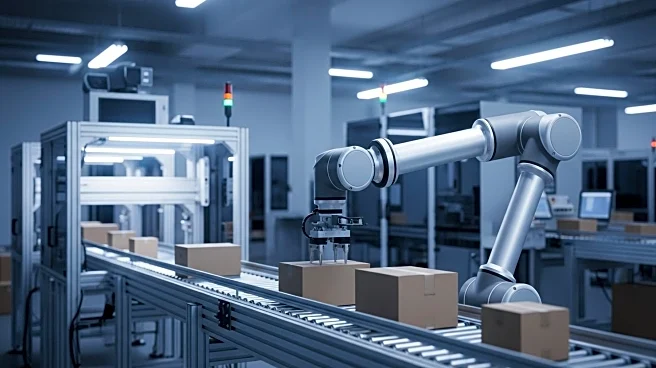What's Happening?
Kroger is reassessing its partnership with UK-based automated warehouse operator Ocado, a move that could significantly alter the landscape of automated grocery fulfillment in the United States. The partnership, initiated in 2018, aimed to establish up to 20 robotic fulfillment centers across the country. Currently, eight centers are operational, with two more expected by early 2026. However, Kroger has slowed its rollout, even closing three 'spoke' facilities last year. This reevaluation has affected Ocado's stock price and sparked discussions about the balance between centralized automated fulfillment and store-based rapid delivery models. The potential termination of their exclusive agreement could allow Ocado to partner with other U.S. retailers.
Why It's Important?
The reevaluation of Kroger's partnership with Ocado underscores a critical shift in the retail and distribution industry towards more flexible and responsive fulfillment strategies. The decision highlights the need for technology investments that can adapt to changing market demands and customer expectations. For Ocado, the potential loss of exclusivity with Kroger could open new opportunities with other U.S. retailers, but it also poses a risk to its current market position. For Kroger, leveraging its extensive store network for distribution could enhance customer service and operational agility, aligning with a hub-and-spoke model rather than relying solely on large regional fulfillment centers.
What's Next?
Kroger's ongoing evaluation of its fulfillment strategy may lead to a shift towards utilizing its 2,700+ store network for distribution, potentially reducing reliance on centralized fulfillment centers. This move could prompt other retailers to reconsider their own fulfillment strategies, balancing between automation and proximity to customers. The industry may see increased competition among technology providers as retailers seek flexible solutions that align with long-term growth strategies and cost pressures. Ocado, on the other hand, may need to explore new partnerships or innovations to maintain its competitive edge in the U.S. market.
Beyond the Headlines
The situation highlights the broader trend of flexibility becoming a key return on investment in automated fulfillment. Retailers are increasingly recognizing that automation is not just about speed and efficiency but also about being prepared for future market demands. This shift may lead to more retailers adopting a mix of technologies, such as cube storage systems and AMR-based solutions, to enhance their fulfillment capabilities. The legal and competitive dynamics between companies like Ocado and AutoStore also illustrate the intense competition and innovation driving the industry forward.










